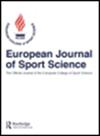Rapid weight loss influences the physical, psychological and biological responses during a simulated competition in national judo athletes
IF 3
3区 医学
Q2 SPORT SCIENCES
引用次数: 13
Abstract
Abstract The effect of rapid energy restriction-induced weight loss on judo-related performance remains unclear, and there is a paucity of information regarding the influence of the fight successions during competition. Thus, the aim of this study was to compare the cumulative effect of judo fights on physical performance, biological and psychological profiles, of national judo competitors with vs without rapid weight loss. After one month of weight maintenance (Baseline), 20 subjects were randomly divided into two groups the week before a simulated competition: (i) a Weight Loss group (WL; weight loss ≥ 3% of body mass); (ii) a Weight Stable group (WS). The simulated competition was composed of five fights (F1 to F5) separated by 30 min rest. Anthropometric assessments were performed at baseline and on the morning of the simulated competition (T0). Psychological, biological and physical assessments (maximal handgrip strength, upper limb anaerobic capacity) were performed at T0 and after each fight. The variation of body mass between baseline and T0 was significantly different between groups (+1.2% vs −3%; p < .01). The dimensions of the Profile of Mood State questionnaire, the rate of perceived exertion, ammonia, urea and free fatty acid concentrations, maximal strength and time sustained at maximal strength showed a significant group x time interaction at F4 and F5. The study shows that cumulative fights lead to uncoupled responses in physical, psychological and biological parameters in judo competitors who underwent or not rapid weight loss. Specific recovery strategies in terms of nutrition and active recovery should be considered.国家级柔道运动员在模拟比赛中快速减肥对身体、心理和生物反应的影响
快速能量限制减肥对柔道相关成绩的影响尚不清楚,关于比赛中搏击顺序的影响的信息缺乏。因此,本研究的目的是比较柔道比赛对国家柔道选手快速减肥和非快速减肥的身体表现、生物和心理特征的累积影响。经过一个月的体重维持(基线),20名受试者在模拟比赛前一周随机分为两组:(i)减肥组(WL);减重≥体重的3%);(ii)体重稳定组(WS)模拟比赛分为5场(F1 - F5),中间间隔30分钟休息。在基线和模拟比赛上午(T0)进行人体测量学评估。心理、生物和物理评估(最大握力、上肢无氧能力)在T0和每次战斗后进行。两组之间基线和T0之间的体重变化差异显著(+1.2% vs - 3%;p < 0.01)。情绪状态量表维度、感知劳累率、氨、尿素和游离脂肪酸浓度、最大强度和最大强度持续时间在F4和F5处显示显著的组x时间交互作用。研究表明,在经历或没有经历快速减肥的柔道选手中,累积的战斗导致身体,心理和生物参数的不耦合反应。应考虑营养和主动恢复方面的具体恢复策略。
本文章由计算机程序翻译,如有差异,请以英文原文为准。
求助全文
约1分钟内获得全文
求助全文
来源期刊
CiteScore
6.60
自引率
3.10%
发文量
153
审稿时长
6-12 weeks
期刊介绍:
The European Journal of Sport Science (EJSS) is the official Medline- and Thomson Reuters-listed journal of the European College of Sport Science. The editorial policy of the Journal pursues the multi-disciplinary aims of the College: to promote the highest standards of scientific study and scholarship in respect of the following fields: (a) Applied Sport Sciences; (b) Biomechanics and Motor Control; c) Physiology and Nutrition; (d) Psychology, Social Sciences and Humanities and (e) Sports and Exercise Medicine and Health.

 求助内容:
求助内容: 应助结果提醒方式:
应助结果提醒方式:


